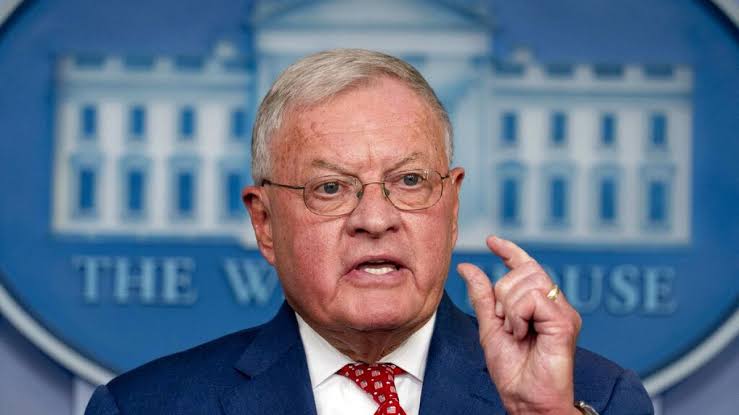Trump envoy predicts quick resolution to Ukraine-Russia conflict

By Tajul Islam
As the dust settles on the US presidential election, President-elect Donald Trump’s approach to international diplomacy is already causing a stir.
One of the most audacious claims came recently from retired US Army General Keith Kellogg, who is poised to become a special envoy for Ukraine and Russia in Trump’s administration.
Speaking on Fox News, Kellogg suggested that Trump could bring an end to the conflict between Moscow and Kiev “within the next few months,” a prediction that has sparked both intrigue and skepticism.
Kellogg hinted at a possible unprecedented diplomatic move, speculating that Trump might invite Russian President Vladimir Putin and Ukrainian President Volodymyr Zelensky to his presidential inauguration.
Such a step, while unconventional, could set the stage for a high-profile negotiation aimed at resolving the prolonged conflict in Eastern Europe.
“President Trump plays three-level chess,” Kellogg remarked, emphasizing the unpredictability and strategic depth he attributes to Trump’s approach.
“It wouldn’t surprise me if he did something like that. Could he do it? Of course, he could. He could make such a bold move.”This comment aligns with Trump’s campaign rhetoric, in which he pledged to resolve the Ukraine conflict overnight.
While these claims were largely dismissed by critics as campaign hyperbole, Kellogg’s confidence underscores the administration’s intent to prioritize a diplomatic resolution.
Trump’s promise to end the hostilities between Russia and Ukraine faces significant challenges. The conflict, which began in 2014 following Russia’s annexation of Crimea and the outbreak of war in Eastern Ukraine, is deeply entrenched.
With thousands of lives lost and millions displaced, it has become a symbol of the broader geopolitical tensions between Russia and the West.
Moscow has shown skepticism toward Trump’s ability to fulfill his promise. Kremlin spokesman Dmitry Peskov recently described Trump’s claim of resolving the conflict overnight as an “exaggeration of sorts.”
However, he also indicated that any US administration pursuing peace would be a welcome change.Trump’s track record of unorthodox diplomacy lends some credibility to Kellogg’s assertions.
During his first term, Trump orchestrated historic meetings with North Korean leader Kim Jong-un, defying decades of diplomatic norms.
Similarly, his administration brokered the Abraham Accords in the Middle East, normalizing relations between Israel and several Arab nations.
These accomplishments may bolster his belief that he can achieve rapid progress in Ukraine.
Yet, the dynamics of the Russia-Ukraine conflict are vastly different. Unlike North Korea, which operates as a relatively isolated state, Russia is a major global power with its own set of strategic interests.
Ukraine, backed by Western allies including NATO and the European Union, is unlikely to concede ground without assurances of sovereignty and security.
Resolving the conflict would require addressing complex issues such as the status of Crimea, the future of the Donbas region, and broader geopolitical tensions between Russia and the West.
Kellogg’s remarks also highlighted Trump’s persona as a leader who “strides the world with confidence and resolve.” This confidence, often characterized by bold proclamations and unconventional strategies, has been a hallmark of Trump’s political career.
During his campaign, Trump repeatedly claimed he could end the Ukraine conflict “literally overnight,” but offered little detail on how he would achieve this.
His statements often leaned on his self-proclaimed prowess as a dealmaker, suggesting that his negotiating skills alone could compel both sides to the table.
While these assertions resonate with his base, they have drawn criticism for oversimplifying a complex geopolitical issue.
Trump’s approach, however, does have its advantages. His willingness to engage directly with adversaries and disregard traditional diplomatic protocols could create opportunities for breakthroughs.
Inviting Putin and Zelensky to his inauguration, for example, would send a strong signal of his intent to prioritize peace in Ukraine.
Such a move would also leverage the media spectacle surrounding his return to the presidency, ensuring global attention on the issue.
The prospect of ending the Ukraine conflict within months raises questions about Trump’s broader geopolitical strategy. Kellogg’s confidence suggests the administration is preparing for a high-profile push, but the specifics remain unclear.
Will Trump adopt a conciliatory approach toward Russia, or will he attempt to pressure both sides into a compromise? Critics argue that Trump’s bold promises may be more about political optics than substantive strategy.
By positioning himself as a potential peacemaker, Trump can bolster his image as a leader capable of achieving what others could not.
This narrative could prove particularly valuable as he seeks to consolidate support both domestically and internationally.
However, the risks of such an approach are significant. If Trump’s efforts fail, they could exacerbate tensions and undermine US credibility.
Furthermore, any perception of bias-whether toward Russia or Ukraine-could alienate key allies and complicate broader US foreign policy objectives.
Russia’s reaction to Trump’s promises has been measured. While the Kremlin has expressed doubts about his ability to resolve the conflict quickly, it may be open to engaging with a US administration that prioritizes diplomacy over confrontation.
Putin has previously indicated a willingness to negotiate, provided that Russia’s interests are respected.
Ukraine, on the other hand, may approach Trump’s overtures with caution. Zelensky, who has sought to strengthen ties with Western allies, is unlikely to accept any deal that undermines Ukraine’s territorial integrity or sovereignty.
Trump’s history of praising Putin and his criticism of NATO could further complicate perceptions in Kiev.
Trump’s promise to end the Ukraine conflict within months is a bold and ambitious claim that reflects his confidence as a dealmaker.
While Kellogg’s remarks suggest a serious intent to pursue peace, the practical challenges remain daunting.
Resolving the conflict will require careful navigation of complex geopolitical dynamics, as well as a willingness to engage with both allies and adversaries.
As Trump prepares to assume office, the world will be watching closely. Whether his unorthodox approach can deliver tangible results or merely add to the rhetoric surrounding the conflict remains to be seen.
For now, Kellogg’s prediction underscores the high stakes and immense expectations surrounding Trump’s return to the international stage.



